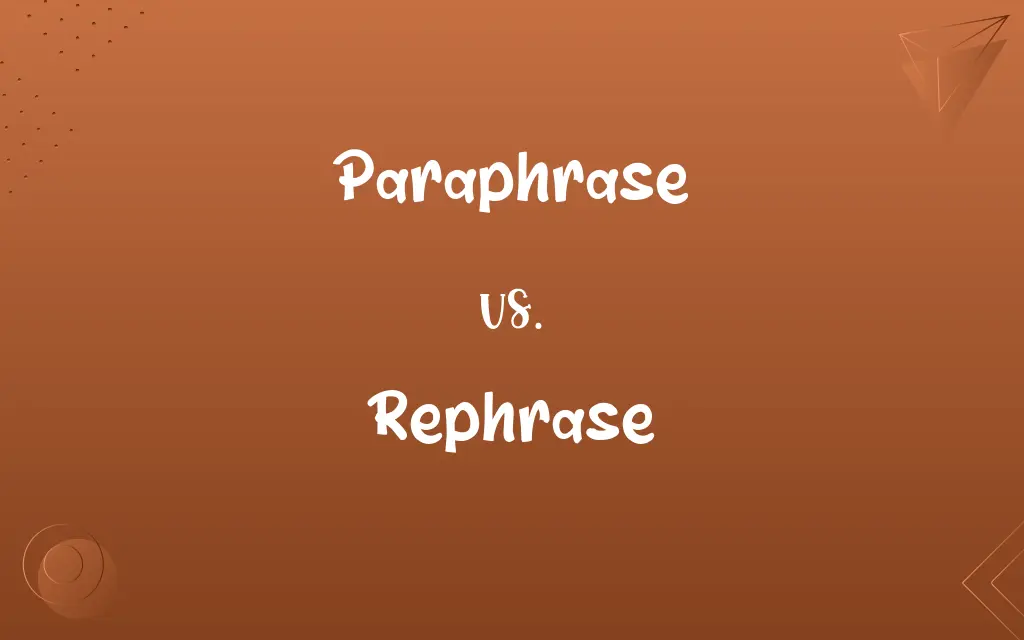Paraphrase vs. Rephrase: Know the Difference

By Shumaila Saeed & Dua Fatima || Updated on March 4, 2024
Paraphrasing involves rewriting text to achieve clarity or alter its form without changing the original meaning, while rephrasing typically focuses on changing the wording of a sentence to improve clarity, conciseness, or style.

Key Differences
Paraphrasing is a technique used to restate content using different words and structures to achieve a clearer or more suitable form, while maintaining the original message and intent. On the other hand, rephrasing often involves making minor adjustments to a sentence or phrase to improve its clarity, conciseness, or stylistic quality without intending to alter its overall meaning significantly.
Dua Fatima
Mar 04, 2024
Paraphrasing is essential in academic and professional settings to avoid plagiarism while incorporating external ideas into one’s work, showing comprehension of the original text. Whereas, rephrasing is commonly used in editing and writing to refine expressions, correct ambiguity, or adjust the tone to better suit the context or audience.
Shumaila Saeed
Mar 04, 2024
While paraphrasing aims to create a new version of a text that stands on its own as an original piece, rephrasing is more about fine-tuning or minor adjustments to existing sentences. This distinction highlights the depth of transformation expected with paraphrasing, as opposed to the more surface-level changes typical of rephrasing.
Shumaila Saeed
Mar 04, 2024
The process of paraphrasing can involve significant changes to the vocabulary, sentence structure, and sometimes the presentation of ideas, to ensure originality and avoid plagiarism. In contrast, rephrasing might simply involve substituting synonyms, altering sentence starts, or reordering words for better readability or flow.
Shumaila Saeed
Mar 04, 2024
Paraphrasing requires a deep understanding of the original text to accurately convey the same message in a new form, demonstrating comprehension and interpretation skills. Reprising, while also requiring understanding, focuses more on language proficiency and the ability to convey the same idea in a slightly different manner.
Dua Fatima
Mar 04, 2024
ADVERTISEMENT
Comparison Chart
Purpose
Restate content for clarity, originality, comprehension
Improve clarity, conciseness, style
Dua Fatima
Mar 04, 2024
Focus
Comprehensive transformation of text
Minor adjustments or improvements
Shumaila Saeed
Mar 04, 2024
Use Case
Academic writing, avoiding plagiarism
Editing, refining expressions
Shumaila Saeed
Mar 04, 2024
Changes Involved
Vocabulary, sentence structure, presentation of ideas
Synonyms, sentence starts, word order
Shumaila Saeed
Mar 04, 2024
Required Skills
Understanding of original text, interpretation
Language proficiency, clarity in expression
Hifza Nasir
Mar 04, 2024
ADVERTISEMENT
Paraphrase and Rephrase Definitions
Paraphrase
Used to incorporate external ideas uniquely.
Paraphrasing sources allows for the integration of research findings.
Shumaila Saeed
Mar 04, 2024
Rephrase
Altering wording to improve expression.
Rephrasing the sentence made its meaning clearer.
Dua Fatima
Mar 04, 2024
Paraphrase
Demonstrates comprehension of the original.
Her paraphrase of the complex theory proved she understood it well.
Dua Fatima
Mar 04, 2024
Rephrase
Involves language skills for precise expression.
Rephrasing requires a good grasp of language to maintain the original idea.
Dua Fatima
Mar 04, 2024
Paraphrase
Rewriting text to maintain original meaning in a new form.
He paraphrased the paragraph to include it in his essay without plagiarizing.
Hifza Nasir
Mar 04, 2024
ADVERTISEMENT
Rephrase
Focuses on minor textual adjustments.
A quick rephrase can often fix ambiguity in a statement.
Shumaila Saeed
Mar 04, 2024
Paraphrase
Involves significant textual transformation.
Effective paraphrasing changes both the words and sentence structure.
Shumaila Saeed
Mar 04, 2024
Rephrase
Used in editing for refinement.
Rephrasing is a common step in the editing process to polish text.
Shumaila Saeed
Mar 04, 2024
Paraphrase
Essential for originality in academic work.
Paraphrasing is key to producing original content in academia.
Shumaila Saeed
Mar 04, 2024
Rephrase
Enhances clarity, conciseness, or style.
He rephrased the awkward sentence to flow better.
Dua Fatima
Mar 04, 2024
Paraphrase
A restatement of a text or passage in another form or other words, often to clarify meaning.
Shumaila Saeed
Oct 19, 2023
Rephrase
To phrase again, especially to state in a new, clearer, or different way.
Shumaila Saeed
Oct 19, 2023
Paraphrase
The restatement of texts in other words as a studying or teaching device.
Shumaila Saeed
Oct 19, 2023
Paraphrase
The adaptation or alteration of a text or quotation to serve a different purpose from that of the original.
Shumaila Saeed
Oct 19, 2023
Paraphrase
To adapt or alter (a text or quotation) to serve a different purpose from that of the original
"It's tempting to paraphrase an environmental slogan and say, 'Think globally, pray locally'" (Christian Science Monitor).
Shumaila Saeed
Oct 19, 2023
Paraphrase
A restatement of a text in different words, often to clarify meaning.
Shumaila Saeed
Oct 19, 2023
Paraphrase
To express, interpret, or translate with latitude; to give the meaning of a passage in other language.
We are put to construe and paraphrase our own words.
Shumaila Saeed
Oct 19, 2023
Repeatedly Asked Queries
When should you rephrase a sentence?
You should rephrase a sentence when you want to improve its clarity, make it more concise, or adjust its style without altering its overall meaning.
Shumaila Saeed
Mar 04, 2024
Is paraphrasing necessary in academic writing?
Yes, paraphrasing is essential in academic writing to demonstrate understanding of source material and to integrate it into your work without committing plagiarism.
Shumaila Saeed
Mar 04, 2024
What makes rephrasing different from editing?
Rephrasing is a part of the editing process focused specifically on changing the wording or structure of sentences for clarity, while editing encompasses a broader range of tasks including grammar, punctuation, and style adjustments.
Shumaila Saeed
Mar 04, 2024
What is the main goal of paraphrasing?
The main goal of paraphrasing is to rewrite text to maintain its original meaning while changing its form, often for clarity, originality, or to demonstrate comprehension.
Dua Fatima
Mar 04, 2024
Can rephrasing help with plagiarism?
Rephrasing can make minor improvements to text, but it might not be enough to avoid plagiarism. Paraphrasing, which involves a more comprehensive transformation, is better suited for incorporating external ideas without plagiarizing.
Hifza Nasir
Mar 04, 2024
How does paraphrasing differ from summarizing?
Paraphrasing involves rewriting a specific text to change its form but keep the same meaning, while summarizing involves condensing a text to highlight its main points, often significantly shortening it.
Shumaila Saeed
Mar 04, 2024
How do you ensure that rephrasing does not change the original meaning?
To ensure that rephrasing does not change the original meaning, focus on the core message of the sentence and use synonyms or adjust sentence structure without altering the intended message.
Shumaila Saeed
Mar 04, 2024
What skills are needed for effective paraphrasing?
Effective paraphrasing requires a deep understanding of the original text, the ability to interpret and analyze information, and the skill to express ideas in new ways.
Dua Fatima
Mar 04, 2024
Does paraphrasing always require citation?
Yes, when paraphrasing someone else’s work, it is important to cite the source to credit the original author and avoid plagiarism.
Hifza Nasir
Mar 04, 2024
Can rephrasing improve writing skills?
Yes, rephrasing can improve writing skills by enhancing your ability to express ideas clearly and concisely, and by expanding your vocabulary.
Dua Fatima
Mar 04, 2024
How do you paraphrase effectively?
To paraphrase effectively, read and fully understand the original text, then express its main ideas in your own words, changing both the sentence structure and vocabulary while maintaining the original meaning.
Dua Fatima
Mar 04, 2024
What is the importance of rephrasing in communication?
Rephrasing is important in communication to clarify messages, adjust tone, make information more accessible, and ensure the audience fully understands the intended message.
Shumaila Saeed
Mar 04, 2024
How can technology aid in paraphrasing and rephrasing?
Technology, such as paraphrasing tools and thesauruses, can aid in finding synonyms and suggesting different ways to express the same idea, though human judgment is crucial to ensure accuracy and maintain the original meaning.
Shumaila Saeed
Mar 04, 2024
Can paraphrasing be used in all types of writing?
Yes, paraphrasing can be used in all types of writing where it is necessary to convey someone else's ideas in your own words, especially to avoid plagiarism and demonstrate understanding.
Shumaila Saeed
Mar 04, 2024
Is it easier to paraphrase or rephrase?
Rephrasing is generally easier than paraphrasing because it involves minor adjustments rather than a comprehensive reworking of text.
Dua Fatima
Mar 04, 2024
Share this page
Link for your blog / website
HTML
Link to share via messenger
About Author
Written by
Shumaila SaeedShumaila Saeed, an expert content creator with 6 years of experience, specializes in distilling complex topics into easily digestible comparisons, shining a light on the nuances that both inform and educate readers with clarity and accuracy.
Co-written by
Dua Fatima








































































